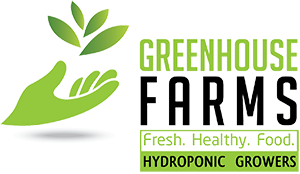
Freshness Year Round
One of the most significant benefits of growing tomatoes hydroponically is the ability to produce fresh new tomatoes year round!
Within the controlled environment of our greenhouse, we are able to manage and extend the production of fruit on all of our tomato plants — 365 days a year; Winter, Spring Summer, and Fall.

Taste
I have tasted hydroponic tomatoes from other greenhouse growers. And you probably have, too. Trust me, they don’t even come close to tasting as good as ours do. And it’s not just our own taste buds telling us this. Most of our customers who’ve purchased our tomatoes say the exact same thing — especially about our cherry tomatoes.
“Once you try a Greenhouse Farms cherry tomato, you won’t want to eat one from anywhere else!”

The reason for the difference is the fact that hydroponic growers have the ability to adapt the plants’ environment in order to control the supply of natural sugars and other nutrients that the plants use to produce fruit.
In our case, we have found the perfect formula of potassium, potash, epsom salt, and iron to make Greenhouse Farms tomatoes especially sweet and tasty!
NOTE:
Hydroponic plants are grown in a sterile media that doesn’t provide any nutrition at all to the plants. Therefore, hydroponic growers have to provide the proper nutrition to the water (in our case, well water). The plants absorb this nutrition naturally.
Nutrition Levels
Generally speaking, the nutrition levels are the same.
On a minuscule level, these are the factors that influence nutrient contents for produce in general — regardless of whether it’s grown in dirt (traditional farming) or grown in water (hydroponic farming):
- Type of fruit or vegetable
- Time of year it’s harvested
- How long after harvesting the food gets eaten
- How the food is handled and stored from farm to fork
“Plants make their own vitamins, so vitamin levels tend to be similar whether a vegetable is grown hydroponically or in soil. It’s the mineral content that can vary in hydroponic crops — depending on the fertilizer used. You can enhance a plant’s nutrient levels simply by adding nutrients to the solution they’re grown in. You could add whatever you wanted: calcium or magnesium, or minor elements like zinc or iron. The result is that vegetables grown hydroponically could even be “nutritionally superior” to traditionally grown ones.”
—Allen V. Barker, professor at the Stockbridge School of Agriculture at University of Massachusetts

Good To Know…
Some helpful tips after you get your tomatoes home:
- Hydroponic tomatoes will last approximately 2-3 weeks after harvesting.
- They will last just as long whether you rinse them with water or not.
- They should be kept cool… but do not put them in the refrigerator! Keep your hydroponic tomatoes in a cool, dry place on the counter or in a cabinet.
